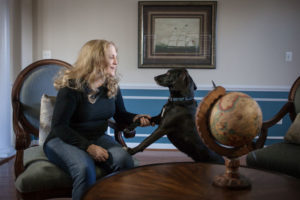For Jenifer Higgins Clark ’69, going off to college meant going across the street.
Her childhood home on Sunken Road had offered a panoramic view of the Mary Washington College campus – a vast playground of soft-sloping hills and stately buildings she’d spent countless hours exploring.
So when Clark’s parents told her and twin sister Judith Higgins Hoye ’69 that if they wanted to go to college, they would have to attend Mary Washington as day students, she felt a tinge of disappointment.
Looking back, she knows she needn’t have.

Math and dogs remain important to Gulf Stream expert Jenifer Higgins Clark, who helps mariners find optimal ocean routes. Photo by John Boal.
Clark had developed a fascination with figures as a first-grader, tutoring math while still in grade school, so she majored in math. The math professors at Mary Washington challenged Clark and taught her to think independently, she said. They left her well prepared for graduate studies at Johns Hopkins University and, later, for a longtime career as a satellite oceanographer.
After graduation, Clark landed her first job with the Naval Oceanographic Office in Washington, D.C., near the apartment she shared with childhood friend Sally Cooke Hanlein ’69. When downsizing ended the job after about a year, Clark went to work for the National Oceanic and Atmospheric Administration. She earned a master’s degree in oceanography in 1975 and became a leading expert on the Gulf Stream, a powerful current in the Atlantic that impacts the world’s climate and weather patterns.
After retirement, Clark and her meteorologist husband, Dane, parlayed their expertise into an oceanography business called Jenifer Clark’s Gulfstream in Dunkirk, Maryland. They provide marine support to sailors and sailboat racers, swimmers and fishers in search of the most optimal ocean routes. Among their clients: Diana Nyad, who at the age of 64 swam from Cuba to Florida in 2013.
Clark’s Mary Washington education was valuable, Clark said, but her college years also turned out to be fun. Many childhood friends – including her still-best friend Hanlein – were classmates. So was Clark’s family dog, Stranger.
The collie-spaniel mix followed Clark around campus, often sitting at her feet during classes or whining outside the door, she said. “Back then, all the town dogs would hang out on campus, including my dog.”
Stranger had an uncanny ability to know when and where Clark’s classes were. He was generally welcomed − or at least overlooked − by professors. Clark’s German teacher was one exception: He would politely ask Clark to remove the “stinky dog” from class, she said. “We used to say Stranger flunked German and passed everything else.”
Today Clark keeps a house full of dogs. She tutors math in her free time. And she remains grateful for the education she earned at Mary Washington.
“I thought it was like a consolation prize,” Clark said. “It turned out to be a real piece of gold.”
